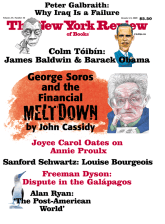In response to:
Georgia and the Balance of Power from the September 25, 2008 issue
To the Editors:
George Friedman’s article on the conflict between Russia and Georgia [“Georgia and the Balance of Power,” NYR, September 25] gets one important fact right: Russia is indeed challenging the liberal world vision in which free yet interdependent nations are able to choose their own destiny. Russia’s preferred view, judging by both its recent actions and official statements, is a nineteenth-century “sphere of influence” perspective which holds that smaller nations that lie within a day’s drive of Russia’s tanks need not worry about their futures; Moscow will make those decisions for them.
On the history of NATO enlargement, however, Mr. Friedman unfortunately gives undeserved credence to a Russian-propagated urban legend that the United States somehow “betrayed” Russia by enlarging NATO. No US president has ever made a promise to keep NATO at its cold war membership, and for good reason. NATO membership for Western European countries during the cold war brought peace to nations that had known centuries of war. NATO membership for Central and Eastern Europe after the cold war extended this peace. Indeed, NATO enlargement, and EU enlargement that followed it, were leading factors in making the region to Russia’s west the most stable and nonthreatening it has been in Russia’s history. I don’t expect Russia will thank us for this act, but it should.
Critics might have consigned 100 million Europeans to a “gray zone” after they had won their liberty after decades of Communist domination and Soviet occupation. But it is faux realism to suggest that indulging Russia’s claims of hegemony over its neighbors will make us—or Russia, for that matter—safer.
A higher realism recognizes that America, for more than a century, has gained in stature throughout the world precisely for its unwillingness to indulge in the cynicism of the powerful and indifferent. We treated Poland and other Central Europeans as actual countries with real people, not just geopolitical abstractions or instruments to be sacrificed to assuage Russia’s outdated sense of imperial entitlement. That approach was developed under Presidents George H.W. Bush, Bill Clinton, and now George W. Bush, and in addition to serving America’s interests, tens of millions of Central and Eastern Europeans have gained in freedom, security, and prosperity as a result.
Daniel Fried
Assistant Secretary of State
Bureau of European and Eurasian Affairs
Washington, D.C.
George Friedman replies:
Mr. Fried is quite persuasive in his case for the way the world ought to be and the way that the Russians ought to think and behave. Unfortunately, he is persuading the wrong audience. If the guarantees to Russia concerning NATO expansion were indeed an urban legend, it is a legend with a great deal of strength in one particular urban setting—Moscow. The Russians have been asserting this claim for years. If Mr. Fried is right and this was a myth, it was a myth with consequences that should have been anticipated by the State Department.
Mr. Fried also writes that NATO and EU enlargement were
leading factors in making the region to Russia’s west the most stable and non-threatening it has been in Russia’s history. I don’t expect Russia will thank us for this act, but it should.
This is the heart of the problem. Mr. Fried argues that NATO has brought peace and stability to Europe. Russia believes that NATO has brought a military threat to its borders. It is possible that Mr. Fried will persuade Mr. Putin of the error of his thinking, but I rather doubt it. The question at hand then is what the United States will do, given Russian views and, more important, actions.
Mr. Fried has missed the key point in my argument, which is that irritating a nation of Russia’s stature without possessing the power to compel it to behave differently may be morally satisfying but practically dangerous. My own hope is that the US State Department, in issuing its condemnations of Russia, would realistically take account of its own power, or lack of it, to compel Russia to change its behavior.
The louder the condemnation, and the weaker the US response, the less credibility the administration has. Moscow’s audience for its Georgia policy was not Washington, but Kiev and Vilnius and the other capitals in the region. The Russians have driven home the key message: that if Russia wishes to act, NATO and the Americans will not place themselves at risk on behalf of their allies. They will content themselves with passionate letters.
Indignation is not a foreign policy.



